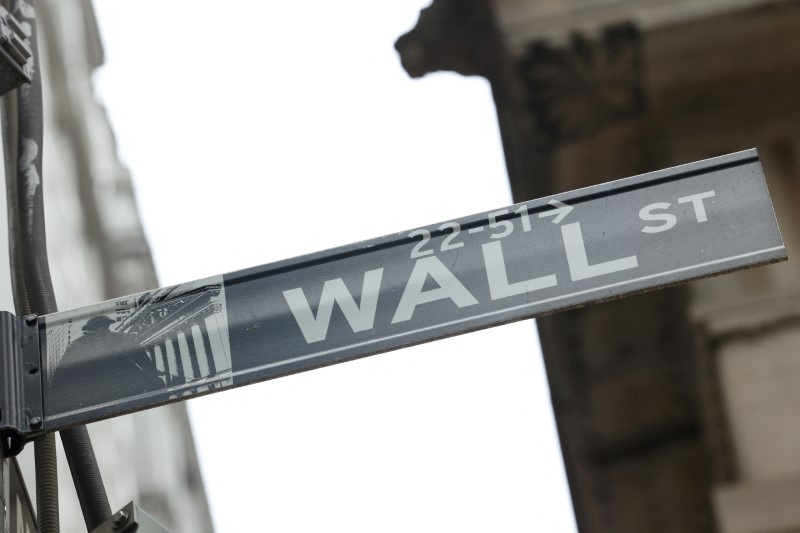(This Sept. 1 story has been corrected to change Jake Jolly’s title to head of investment analysis in paragraph 10)
By David Randall
NEW YORK (Reuters) – Signs of rising consumer stress are prompting some fund managers to grow more conservative in their outlooks, even as the broad stock market continues to rally.
While unemployment remains near historic lows, the Federal Reserve’s inflation-fighting interest rate hikes are starting to weigh on households.
Consumer confidence fell more than expected in August, while delinquency rates among credit cards issued by smaller banks are the highest on record, according to data from the Apollo Group.
Department store Nordstrom said last week that delinquencies on its store cards are now higher than pre-pandemic levels. Rival Macy’s said it expects late payments to reduce credit-card revenues by 41% from the previous quarter.
Payments on approximately $1.1 trillion of federal student loans will resume in October, potentially setting consumers up for a “payment shock” of $500 or more each month, according to a study by TransUnion.
“The U.S. consumer is on thin ice coming into the final stretch of 2023,” said Emily Roland, co-chief investment strategist at John Hancock Investment Management. She is more bullish on bonds and defensive sectors like healthcare ahead of the fourth-quarter holiday shopping season.
The U.S. economy added 187,000 non-farm jobs in August, slightly above expectations, while the unemployment rate rose to 3.8%, the Bureau of Labor Statistics said Friday. The government significantly lowered its previously reported estimates for job growth for June and July.
Further declines in the labor market will likely act as a double-edged sword for investors, relieving some inflation pressures while weighing on consumer spending.
Overall consumer spending rose slightly more than expected in August, while the savings rate fell to its lowest since November 2022, the Commerce Department said on Thursday.
Consumers will “very soon” exhaust their excess savings built up during the pandemic, said Jake Jolly, head of investment analysis at BNY Mellon Investment Management, who is underweight equities and expects that the U.S. economy is on the path toward a recession.
“It does beg the question of how long consumer spending can surprise to the upside,” he said, adding that bonds continue to look more appealing, given a rise in yields that has pushed the 10-year Treasury yield above 4%.
Overall, consumer spending growth will fall from 2.3% in 2023 to 0.9% in 2024, said Gregory Daco, chief economist at accounting giant Ernst & Young, due to higher interest charges, fewer available savings and student loan payments. He said the economy will post below-trend growth for several quarters.
Investors will receive an updated view of consumer credit usage and a reading of the ISM services sector, which accounts for two-thirds of the economy, next week.
Betting against the consumer spending has so far been a losing wager. The US economy continues to grow at what the Atlanta Fed’s GDPNow estimates is an annualized 5.9% rate in the third quarter.
Interest rates are likely to fall over the fourth quarter of the year and into 2024 as inflation fears ebb, providing some cushion for consumers, said Jason Draho, head of asset allocation Americas at UBS Global Wealth Management, who expects investors to buy into any dips in consumer stocks.
“The US consumer, and therefore the economy, should remain fairly resilient well into 2024,” he said.
The consumer discretionary sector, which includes stocks like Amazon.com, Royal Caribbean Cruises and Chipotle Mexican Grill, is up nearly 34% for the year to date, nearly double the gain of the S&P 500 index as a whole.
Yet the sector has lagged lately, gaining less than 1% since July 1 while the S&P 500 is up nearly 2% over the same time.
Even if consumer spending does fall significantly, the strong rally in the sector will likely wane as the tech-driven broader market slows over the fourth quarter, said Sandy Villere, a portfolio manager at Villere & Co.
As a result, Villere is building up his positions in defensive sectors such as healthcare that have not lagged.
“We think it’s premature to move away from the consumer now, but we can see a recession hitting in the first quarter as the Fed’s rate hikes start to kick in,” he said.
(Reporting by David Randall; editing by Megan Davies and Andy Sullivan)
